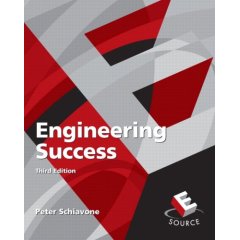

Most first year engineering students arrive in college or university without the necessary study and survival skills required to be successful at the university level. Equipped with attitudes, work ethics and strategies that worked well in high school, most are simply unprepared for the freedom university life affords them let alone the challenges of an often rigorous and demanding curriculum. Faced with a vastly different educational environment, most find it extremely difficult to adapt to the different ways in which information is delivered and the amount of independent learning expected of them. These deficiencies are, perhaps, largely responsible for the unacceptably high attrition rates among first year engineering students.
Most educators agree that in order to improve the quality and quantity of well-trained, engineering graduates, incoming students need to be taught how to be effective in the university environment. In particular, they need to be trained in:
Most of these skills are not required in the secondary education system since the learning environment is much more controlled - students can always rely on teachers to answer all their questions and to provide them with all the necessary information. In university, however, there are new pressures, new people, new competitors and new standards. All of a sudden students find that there is no longer one single source of knowledge and they have to learn to find things out for themselves; they find themselves surrounded by people as smart if not smarter than they are; standards previously accepted as excellent become good or average; they find out quickly that high school routines, attitudes and philosophies don't work anymore; they may be homesick, have financial problems (perhaps it's the first time they've been away from home); their parents might be pressuring them to be the best student out of the 500 or so in the freshman year. Everything is different - a whole new world.
The way to fill this gap, is to train students for success in engineering. This means providing all incoming engineering students with training in the above skills as soon as possible after (preferably before) their arrival in college or university. After all, these skills are not only valuable in engineering study, they are also highly prized by employers - so why not give our students a head start ?
The presentation is divided into ten chapters. Each chapter is followed by a set of thought-provoking problems designed to reinforce the material discussed in the preceding chapter. This material is aimed specifically at engineering students. Consequently, the presentation makes use of actual mathematics, physics and similar technical information from typical first year engineering courses to illustrate ideas and concepts. It should be noted, however, that the level of technical knowledge is kept to the minimum necessary for the correct presentation of the material and should pose no problem to any new or prospective engineering student.
This book is published by Prentice-hall, Inc. New Jersey, 1999 ISBN 0-13-080859-8 as part of the ESource Series - see ESOURCE.
or
Any questions or requests for an inspection copy can be directed to
Peter
Schiavone at:
P.Schiavone@ualberta.ca